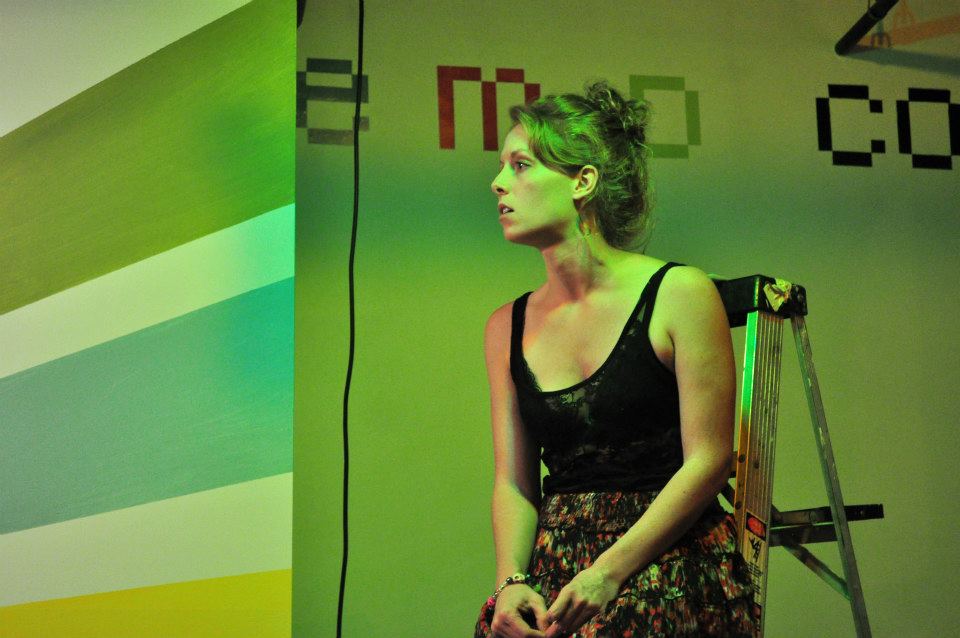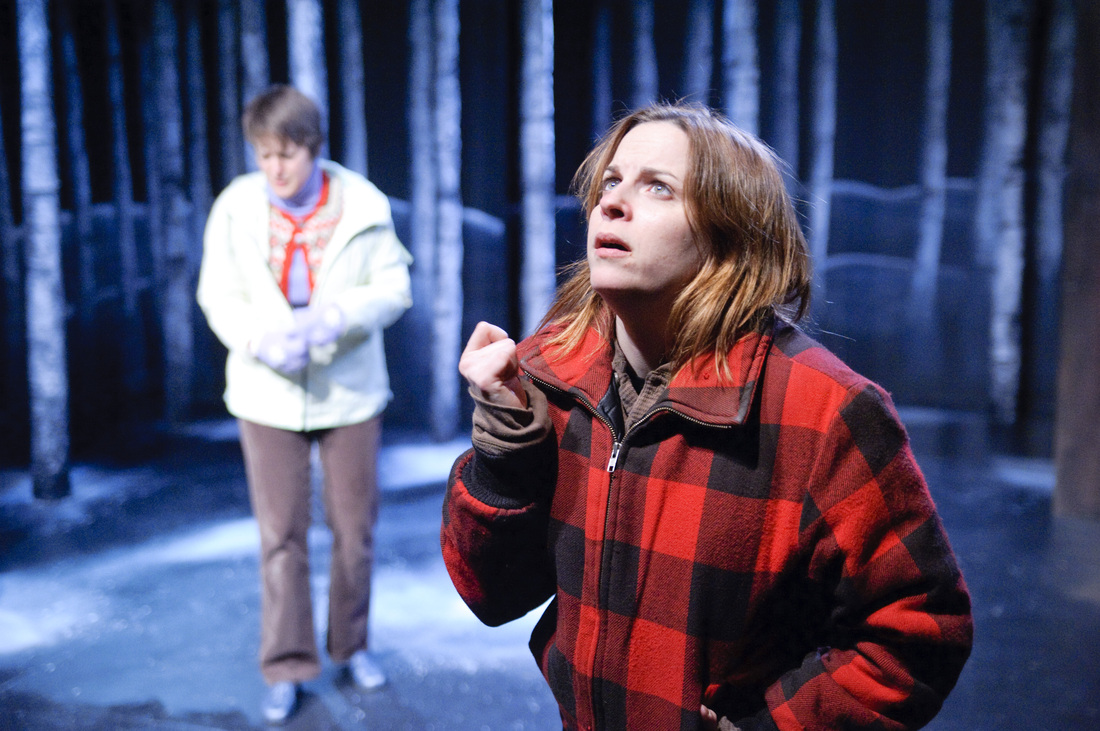|
JL: How long have you lived and worked as a playwright in DC? What brought you here? Why have you stayed?
LM: I’ve worked as a playwright in DC for a little over two years now, but I’ve been back in town for four (I lived here after college, then moved away, then came back again). I’m here because DC is the place I call home: I’m from a small town about an hour away, went to U Maryland, and have a wonderful circle of loved ones here. The healthy amount of opportunities in town don’t hurt either! It’s a nice time to be an artist in DC. JL: Have you ever been a member of a DC area playwrights writing group? If so, did you find it useful? Would you recommend that other playwrights join them? LM: Not yet, but I’m planning to start going to meetings at the Playwrights’ Gym. I visited a session as a reader after meeting DW Gregory, one of their founding members, and liked the group's no-nonsense approach. Also, I work closely with my friends a lot, so it’s refreshing for me to spend time with people who aren’t necessarily personal friends or even peers—shakes things up a bit. There’s a nice variety of styles and personalities in the group. Last time they provided really nice snacks, too, so I hope that happens again. JL: In DC, we have the Capital Fringe Festival, the Intersections Festival, the Source Theatre Festival, the Kennedy Center's Page-to-Stage Festival, the Black Theater Festival, and the Hip Hop Theatre Festival. We also have the Mead Lab at Flashpoint Theater Lab Program. Have you participated in any of these? If so, can you speak about your experience? LM: Yes, I’ve done Page-to-Stage twice, and participated in an Artistic Blind Date at the Source Festival. I highly recommend them both. Page-to-Stage is a great chance to have your work heard in a safe environment, but I do think you get out of it what you put in. You won't get much in the way of gusto from the Kennedy Center, so it’s best to go with a good, supportive team who will rally around your play along with you. As for the Source Festival ABD, it was quite a different animal than the workshops and productions I’m used to. It was very open-ended and self-directed, and was one of the longest project periods I’ve ever experienced. But it was well worth it. Source was a lot of work, but I came out of it a better and braver artist, and made two new, amazingly talented friends I never would have met otherwise. JL: What kind of work do you do to pay the bills? How do you balance this work with your writing? LM: I have a nine-to-five job in public media. Obviously working all day makes writing a part-time gig, which is very hard to handle and stay positive about sometimes. On the other hand, though, I love my job and believe in public broadcasting and in the work that we do. And health insurance is great! Balance is something I’m still trying to figure out—but I’m realizing that perhaps that’s just the way life is and always will be. I write when I can. I also make sure to create deadlines for myself, particularly ones that involve other people, so I HAVE to do it, even when I'm tired. JL: How many plays have you had produced in the DC area? Were any of these plays self-produced? If so, where and what did you learn from that experience? lM: One play. The nice folks at Taffety Punk Theatre Company produced my first play, Owl Moon, and I’m still kind of amazed they took a chance on me like that. When I think about that beautiful set, I still have to pinch myself! I’ve had a few readings out there too, both self-produced and not, but have yet to self-produce a show because just thinking about it immediately overwhelms my brain. If I could make it work, I’d gather a team and some funding to do Fringe and Mead Lab. JL: If you could be produced at any theatre in DC, which would it be and why? lM: If we’re shooting for the moon here, I’m going with Woolly Mammoth and Contemporary American Theatre Company (ok, sort of near DC) because we’re interested in a lot of the same things. In a theatrical sea of old-ass productions, Woolly is actually producing theater made by living artists (how revolutionary!), and understands how design, style, and new ideas make theater exciting. CATF is where I started out, so it’s always been a dream of mine to return there. They love new plays and take risks on them, and their production process is so pure and out of the ordinary, I can’t really think of a better environment in which to make theater. Dreaming, dreaming is free. JL: DC audiences are ... LM: All over the place, as people tend to be. Sometimes they are filled with wonderful passion and smarts and enthusiasm, and sometimes they are rude nincompoops. If we’re going to make sweeping generalizations, I’d say that the scrappier and more broke the production, the more interesting the audiences get. I love audiences who want to be there. People who come to see my stuff, especially the people I don’t know, blow me away with their generosity. JL: DC actors, designers and directors are … LM: Pretty darn good! I’ve met and seen the work of so many theatermakers who care so deeply about what they do and about doing it well, they make me want to work 10x harder. This is an industry of lionhearted, passionate workers, and it makes me proud every day to be part of it. I also need to plug the designers and performers of my alma mater, because they are absolutely incredible artists and craftspeople. JL: DC critics are ... LM: All over the place, as journalists tend to be. Sometimes they are filled with wonderful passion and smarts and enthusiasm, and sometimes they are rude nincompoops. Ha, I kid. Kinda. There’s a wide spectrum of talent and theater knowledge among our city’s pro to pro-am critics, but I will say that overall, it makes me really happy that they are all so engaged and so plugged into the community. I look at The Washington Post every day for local theater news, and I know I’ll see news and commentary of interest, not just reviews. You won’t find such things in every city! JL: How do you feel the DC theatre community has addressed the issues of race and gender parity ? How has this particular issue impacted you and your ability to get your work produced on the main stages? LM: I don’t know. Some theaters, like Forum Theatre and Theater J, have taken real, active steps to make positive change in the world, but that’s all I know about concretely. I’m also not sure what to say about this because it’s a problem everywhere and in everything right now, and I don’t fully understand why it continues. But it does. White privilege and male privilege exist. When I started out, I thought about using a male alias in order to be taken more seriously because plays about women are “issue” plays, you see, as are plays by people of color. I wrote a short blog post about gender issues in 2011, if you want to take a look, but it really just scrapes the tip of a massive, massive, ugly iceberg. At the end of the day, I see myself as just a playwright, plain and simple. I can’t help how I look or what I find interesting, so for now the best I can do is to keep on chugging along and not let people’s personal crap and dumb attitudes bog me down. JL: What advice do you have for an up and coming DC based playwright or a playwright who has just moved to D.C.? LM: Oh brother, I have no idea. I could use some advice myself! All I can share is what’s worked for me so far, and that is to find your true friends and kindred spirits in the industry. It’s a long, lonely haul without that. So far, “networking” has amounted to a hill of beans for me. Working with people who are real friends—that’s where it’s at. It’s a mean ol’ world out there. If you're new to DC, get to know the lay of the land because this is a remarkably accessible theater community. JL: What's next for you as a playwright? Where can we keep up with your work? LM: Next up for me is work and more work. I’m writing a new script this fall and trying to keep up with my long list of revision tasks and nitpicky theater business stuff. You can follow me on Twitter (@lizmaestri) or visit my jankity but well-meaning website. I’d like to meet new people in town, so please feel free to get in touch!
0 Comments
Your comment will be posted after it is approved.
Leave a Reply. |
My BlogI'm a playwright, dramaturg, and teaching artist. It is here where you'll find my queries and musings on life, theater and the world. My posts advocate for diversity, inclusion, and equity in the American Theatre and updates on my own work. Please enjoy!
Categories
All
Archives
June 2020
Reading List
|



